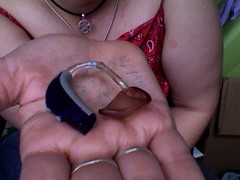Audiologist
Audiologists work with children who have difficulties with the ear (trouble hearing) and/or the vestibular (balance) system (see ECI Glossary). In Canada, audiologists must have at least a Master’s degree or its equivalent in order to practice in the country (Fig. 1).
Figure 1. Audiologist
Audiologists offer the following services to children who are deaf or hard of hearing:
- Checking a child’s ability to hear sounds at different decibel (see full Glossary) levels;
- Producing a report that details the degree and type of hearing loss. The report is a graph and it is called an audiogram;
- Offering recommendations regarding the use of assistive devices (see full Glossary) that would improve a child’s ability to hear;
- Teaching children and parents how to use assistive devices, such as hearing aids (see full Glossary) (Fig. 2) and FM systems (see full Glossary);
- Teaching children how to communicate their needs to others;
- Teaching children how to understand what others are saying;
- Working with the members of the Individual Education Plan (IEP) (see full Glossary) team.

Figure 2. Hearing aids
Audiologists also:
- Check the the child’s vestibular system (see ECI Glossary) and sense of balance;
- Check a child’s skills and needs in order to determine if the child has an auditory processing disorder (see full Glossary);
- Offer intervention advice to children who have difficulties with their vestibular system, or who have an auditory processing disorder.
To learn more about audiologists, please visit the following website.
0 comments
Kick things off by filling out the form below.
Leave a Comment